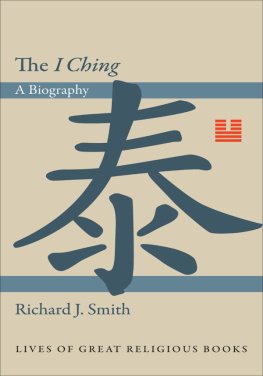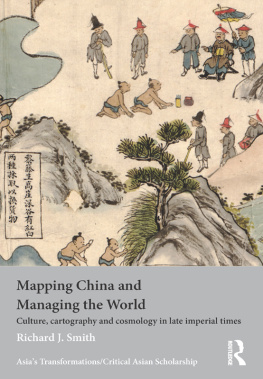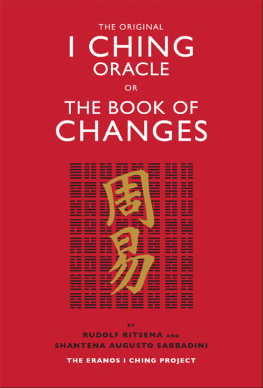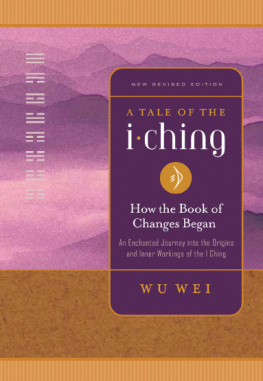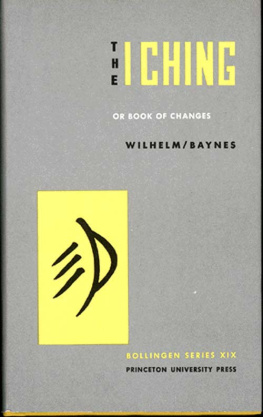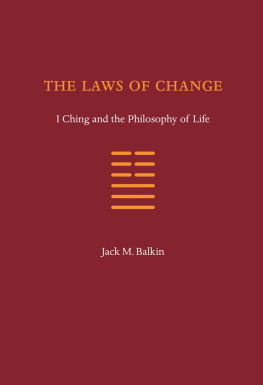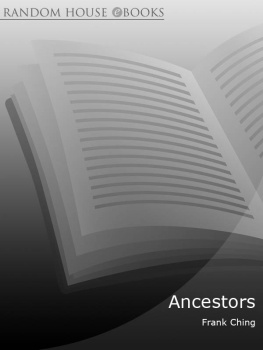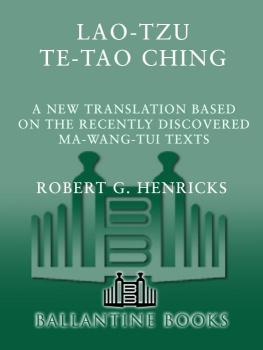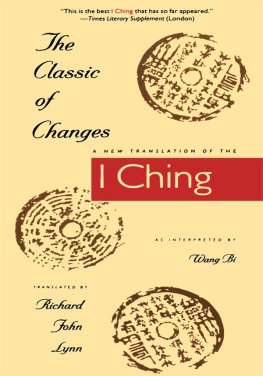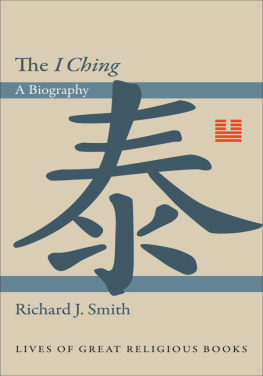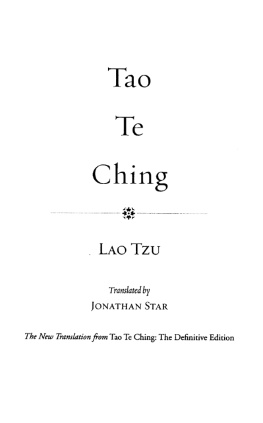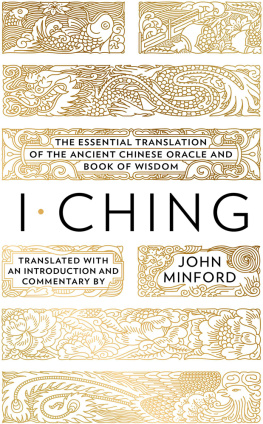LIVES OF GREAT RELIGIOUS BOOKS
The I Ching
LIVES OF GREAT RELIGIOUS BOOKS
The Book of Mormon, Paul C. Gutjahr
The Tibetan Book of the Dead, Donald S. Lopez, Jr.
Dietrich Bonhoeffers Letters and Papers from Prison, Martin E. Marty
The I Ching, Richard J. Smith
Augustines Confessions, Garry Wills
FORTHCOMING:
The Book of Revelation, Bruce Chilton
Confuciuss Analects, Annping Chin and Jonathan D. Spence
The Dead Sea Scrolls, John J. Collins
The Bhagavad Gita, Richard H. Davis
Josephuss Jewish War, Martin Goodman
John Calvins Institutes of the Christian Religion, Bruce Gordon
The Book of Genesis, Ronald S. Hendel
The Book of Common Prayer, Alan Jacobs
The Book of Job, Mark Larrimore
C. S. Lewiss Mere Christianity, George Marsden
Thomas Aquinass Summa Theologiae, Bernard McGinn
The Greatest Translations of All Time: The Septuagint and the Vulgate, Jack Miles
The Passover Haggadah, Vanessa Ochs
The Song of Songs, Ilana Pardes
Rumis Masnavi, Omid Safi
The Yoga Sutras of Patanjali, David Gordon White
The I Ching
A BIOGRAPHY
Richard J. Smith
PRINCETON UNIVERSITY PRESS
Princeton and Oxford
Copyright 2012 by Princeton University Press
Published by Princeton University Press, 41 William Street,
Princeton, New Jersey 08540
In the United Kingdom: Princeton University Press, 6 Oxford Street,
Woodstock, Oxfordshire OX20 1TW
press.princeton.edu
All Rights Reserved
Library of Congress Cataloging-in-Publication Data
Smith, Richard J. (Richard Joseph), 1944
The I Ching : a biography / Richard J. Smith.
p. cm. (Lives of great religious books)
Includes bibliographical references and index.
ISBN 978-0-691-14509-9 (hardcover : alk. paper) 1. Yi jing. I. Title.
PL2464.Z7S63 2012
299.5 1282dc23
2011041070
British Library Cataloging-in-Publication Data is available
This book has been composed in Garamond Premier Pro
Printed on acid-free paper.
Printed in the United States of America
10 9 8 7 6 5 4 3 2 1
For the literary members of my family, Lisa and Tyler, in celebration of Negative Capability, and with unbounded admiration, gratitude, and love
Contents
Detail from Zhu Das Fish and Rocks (Chinese, 16241705)
Five Agents Sequences
Correlations among the Trigrams, Hexagrams, and Twenty-Four Segments of the Solar Year (attributed to Jing Fang)
Trigram and Five Agents Correlations
The Luo River Writing and the Yellow River Chart
The Later Heaven and Former Heaven Sequence
The Luo River Writing and the Former Heaven Sequence
Triangular Diagram of Yellow River Chart Correlations
Production of the Eight Trigrams from the Supreme Ultimate
Illustrations of a Divination Table and the Process of Milfoil Separation
An Yijing-Inspired Japanese Painting: Uragami Gyokudos (17451820) Reading the Changes Sitting by a Mountain Waterfall
The Generative Power of the Supreme Ultimate
Vietnamese Yijing Manuscript in Classical Chinese and Nom Characters
Trigrams on a Tibetan Ritual Horn
One Version of Bouvets Chart of Heavenly Superiority and Earthly Subordination
Shao Yongs Former Heaven Chart
The Supreme Ultimate Symbol
Trigrams on a Ritual Bell in the Shanghai City God Temple
Detail of a Qing Dynasty Fengshui Compass
Qing Dynasty Map of the Fixed Positions of Heaven and Earth





Note: Much debate surrounds the dating of the earliest Chinese dynasties (especially the Xia, which many scholars consider to be semihistorical), and even later dates are sometimes highly contested.

The curse of China studies for Westerners has always been the transliteration of Chinese sounds. For many years the scholarly (and popular) convention was to use the so-called Wade-Giles system for rendering Chinese names, terms, and titles, which is why so many people in the West know the Classic of Changes as the I Ching. I have retained this long-standing usage in the title of this biography, but in the body of the book I have rendered it according to the more current Pinyin system of transliteration: hence, Yijing. I have employed similarly standard conventions for the transliteration of other Asian names but have eliminated most diacritical marks and have tried to keep technical terms and titles to a minimum. For instance, although the two characters for Yijing are pronounced (and therefore transliterated) in sometimes radically different ways in Japanese (Ekikyo), Korean (Yokkyong), Vietnamese (Dich Kinh), and Tibetan (Yi Kying), I have used only the Chinese (Pinyin) transliteration of this title in the text, regardless of the culture area under discussion. In the same spirit, I have translated into English (or used already common renderings of) virtually all the technical words, expressions, terms, and titles in the main part of this book, relegating transliterations to the index, in parentheses that follow the translated terms and titles.
Since this book is designed primarily for nonspecialists, I have not burdened it with detailed descriptions, elaborate footnotes, discussions of arcane scholarly debates, or extensive bibliographies in Asian and Western languages. Material of this sort may be found in my 2008 book, Fathoming the Cosmos and Ordering the World: The Yijing (I-Ching, or Classic of Changes) and Its Evolution in China. I am grateful to the University of Virginia Press for permitting me to draw from parts of this work in my discussion of the domestic development of the Changes. I might add that the acknowledgments, notes, and bibliographies of Fathoming the Cosmos reveal abundantly the profound debt I owe to my teachers in the China field, my many valuable friends and colleagues at Rice University, and a host of other scholars around the world, several of whom also deserve special mention here for their specific contributions to this volume: Joseph Adler, Alejandro Chaoul, Howard Goodman, Tze-ki Hon, Pei Jin, Yung Sik Kim, Livia Kohn, Liu Dajun, Richard John Lynn, Naturaleza Moore, Benjamin Wai-ming Ng, Bent Nielsen, Valrae Reynolds, Hyong Rhew, Dennis Schilling, Edward Shaughnessy, Shen Heyong, Kidder Smith, Benjamin Wallacker, Wang Mingxiong, and Zhang Wenzhi.
There are literally hundreds of Western-language translations of the Yijing (also known as the Zhou Changes), several of which I discuss in . For this biography I have drawn upon, and modified when necessary, five well-known renderings that reflect different understandings of the work as they developed at different periods in Chinese history: (1) Richard Kunsts dissertation, titled The Original
Next page
